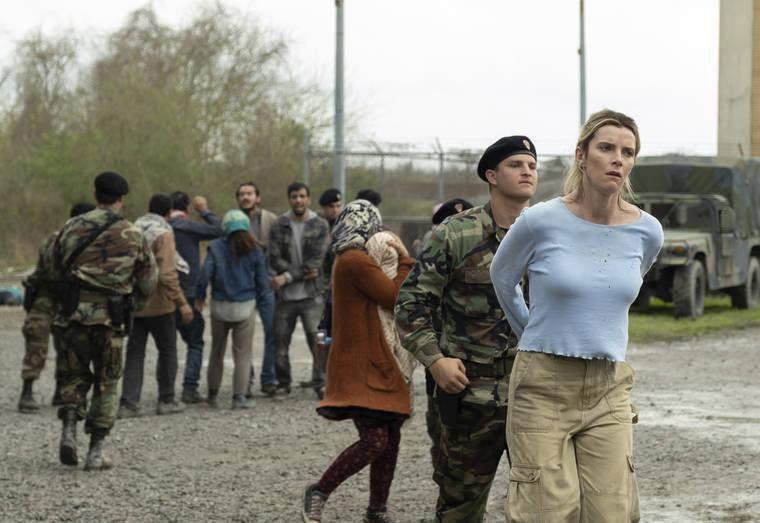Review: Betty Gilpin saves the shallow satire ‘The Hunt’

COURTESY UNIVERSAL PICTURES
Betty Gilpin, right, and Yosef Kasnetzkov in a scene from “The Hunt.”
“THE HUNT”
**
(R, 1:29)
After being pulled from the release calendar in the fall of 2019 in the wake of a summer of mass shootings, Universal and Blumhouse’s “The Hunt,” a titillating, topical take on “The Most Dangerous Game,” took on the sheen of something forbidden, illicit, too shocking to be seen. It’s a bit of extratextual intrigue that bestows the shock shlock with a bit more profundity than it earns.
Kill-or-be-killed thrillers about the most taboo of hobbies, human hunting, have been around for about a century, from 1924’s “The Most Dangerous Game” short story, to 2000’s “Battle Royale,” to the blockbuster “Hunger Games” franchise. This cartoonishly violent version, written by Nick Cuse and Damon Lindelof and directed by Craig Zobel, has a provocative if underdeveloped premise that carries all the biting social commentary of a late-night comedy sketch. It poses the question: “What if Twitter sniping involved actual sniping?”
The hunters are caricatures of the “liberal elite,” wealthy white folks who talk a big politically correct game while talking trash about the “deplorables” behind the closed doors of their private group chats. When a group of white, lower-class, mostly Southern Americans wake up in a field, gagged, with a random arsenal of weapons and under heavy rifle fire, it’s clear the heated online discourse has now become manifest. For a right-wing conspiracy theorist, it’s a dream come true, but maybe under different circumstances.
Don't miss out on what's happening!
Stay in touch with breaking news, as it happens, conveniently in your email inbox. It's FREE!
The game, dubbed “Manorgate” by the more conspiracy-minded victims, is a self-fulfilling prophecy. An homage to “Pizzagate,” it’s proof that if you wish and rant against something that doesn’t exist hard enough, maybe it’ll come true, in violent, lethal ways. But unfortunately (or maybe fortunately) “The Hunt” doesn’t say anything deeper than “online discourse and cancel culture has gone too far.” Really radical stuff there. Don’t bother digging too deep into the film’s actual politics, which are too shallow and too questionable to bear scrutiny. But it’s too brisk and too bloody to let you think or feel about anything for too long. Besides, there’s Betty Gilpin, and “The Hunt” is worth the price of admission for her performance alone.
Gilpin, the star of Netflix’s “GLOW,” commands the screen as Crystal, a poker-faced Mississippi car rental agent who doesn’t panic when she finds herself as prey, and it immediately becomes crystal clear that she has a very specific set of skills. Gilpin is a remarkable physical performer, from her incredible stunts and combat skills to the eerie stillness with which she can control her face. “The Hunt” makes the case for this absolute star to get her own action franchise, and fast.
Her performance is deeply strange, and utterly mesmerizing. Crystal’s almost robotic at times, but when she does emote, it’s spectacular. Confiding to a military consultant, she admits, “I’m feeling a little bit (teeth-gritting grin), and since I work at a car rental place, I’m hoping that today I can put some of that (teeth-gritting grin) somewhere,” while a single tear escapes down her cheek. It’s the stuff Oscar clips are made of, if the Oscars ever recognized genre movies, and cements Gilpin as one of our best and boldest actresses.
Though it’s been the subject of much controversy, the only thing worth discussing about “The Hunt” is the genius of Betty Gilpin. The story is too pat, and flat, to invite any real discussion with, or about it, but Gilpin offers up a performance that you won’t be able to shake.



